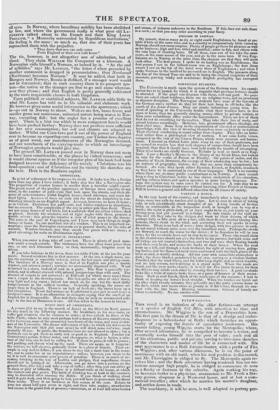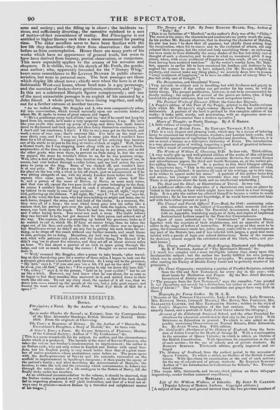r ZWIGGINS.
Tins novel is an imitation of the older fictions—an attempt at a species of English Gil Bias, with attention to time and circumstances. Mr. Wiggins is the son of a Dorsetshire boor. His first part in the drama of life is that of a drudge and under- shopman to a haberdasher at Bath ; which furnishes an oppor- tunity of exposing the frauds of speculative tradesmen. His master failing, young Wiggins starts for the Metropolis; where, after several adventures, he is compelled to become a waiter, and eventually works himself into the post of valet ; each and all of his situations, public and private, serving to introduce sketches of the characters and modes of life he is connected with. His next appearance is as a Bath fortune-hunter, with a prefix of Fitz to Wiggins ; and, after various dilemmas, he is on the point of matrimony with an old maid, when his real position is discovered, and Mr. Fitzwiggins is obliged to fly. The Metropolis again re- ceives bin, ; and the Bath adventure having rendered him too no- torious amongst high people, he is obliged to commence de now as a flunky or footman in the suburbs. Again working his way, he becomes butler to a physician, amanuensis to Mr. Froth a lite- rary genius, shopman in a West-end house, and at last a com- mercial traveller ; after which he marries his master's daughter, and settles down in trade.
The machinery, it will be seen, is well adapted to portray per- sons and society ; and the filling up is clever ; the incidents va- rious, and sufficiently diverting; the narrative subdued to a sort of matter-of-fact resemblance of reality. But Fitzwiggins is not entitled to higher literary rank than a mere amusement for passing time. The elder novelists seem to have been familiar with the low life they described—they drew from observation : the author before us from contemplation. Hence there are many parts of his works which have no appearance of general truth, but seem to have been derived from hearsay, partial observation, or conjecture. This more especially applies to the arcana of his servants and shopmen. It is visible, too, in his sketch of Mr. Froth, the gentle- man author; who, apparently intended for the " literary Whig," bears some resemblance to Sir LYTTON BULWER in public charac- teristics, but none in personal ones. The best passages are those which display life about town ; chiefly seen when the hero is at the fashionable West-end house, whose head man is a gay personage, and the associate of broken-down gentlemen, roisterers, and " legs." In this set a celebrated Marquis figures conspicuously ; and one of the most extractable passages is an exploit of his narrated by a Jehu friend. A whole party have been dining together, and sally out for a further carouse at another tavern— ,4 As we walked along, Mr. Ruggles and I, who were comparatively sober, fell into conversation, which turned naturally upon our eccentric leader, of whom Mr. R. spoke in terms of great esteem and regard. "' He's a gentleman every inch. of him,' said he, ' and if he could but keep his hand from his mouth, he'd make a very sooperior coachman, I say. He isn't like your swells who mount up a-top of a drag, and drive four made horses down to Richmond and back again, and then fancy themselves coachmen ; but I don't call 'em coachmen, I don't. I like to see a man get on the bench, and work a team of rum uns; that's summut like. I've been on the road now near thirty year, and I've seen my Lord do some jobs that I wouldn't have done for a bit of money. I suppose you've heard of his ordering four hunters out of the stable to be put to his drag at twelve o'clock at night ? Well, that's a blessed truth, for I was stopping down along with un at his seat in North- amptonshire at the time it came off. I said all as lay in my power, and so did the other gents. who were there, to prevent un from doing it, but the inure we argued, the more he wouldn't listen to us, for he was precious swipy. Well, after a deal of trouble, these here hunters was put to, for none of 'em, in course, had ever looked through a collar before, and my lord orders the com- pany to jump on the drag. Some of 'cm choked off, and wouldn't have it at any price. Mr. D'Arcy was the first to follow the governor, and took his place on the box with a weed in his off check, just as unconcerned as if lie was sitting alongside of me, with my steady London team before him. The captain then came next, but looking as if he didn't above half like it, and a parson of the name of Brown, or Davis, or some such name, and that was all, except the two poor devils of grooms belonging to the drag. In course I couldn't leave my friend in such a situation, so I just hitched up behind to be ready in case of any accident. "Are you all right," says my lord, gathering up the ribbons. "All right, Sir," says I. "Let 'cm go," says he, and, at the word, the four men, who had been holding on might and main, one to each horse, dropped the reins, and laid hold of the cloths. In a moment, Sir, they were all of a heap ; the near wheel horse goes into his collar like a cannon shot, his partner gets over the pole, and both the leaders, which was mares, run back upon the coach. There he had 'eni, two milling, one bolting, and t' other laying down. You never saw such a mess. The stable fellows they run forward to help, but got damned for their pains, and ordered out of the way. The captain, who was standing up behind the governor, looks as if he wanted to cut it, which Mr. D'Arcy no sooner twigs, than he takes the cigar out of his face, and coolly tells him to sit still—there was no danger; but Smallbones swore he didn't see any fun in getting his neck broke for no- thing, so he drops off the coach without any further remark, and small blame to him, perhaps, for so doing. Meantime, my lord was busy with the team, and, what with patience and pluck, and the double thong, I'm blessed if he didn't wag 'cm in about five minutes, and they set off at about sixteen miles an hour. We had about a quarter of an inch to spare going through the lodge, and not so much turning the corner: I thought we never could have done it.
"' Well,' resumed Mr. Ruggles, after a pause to take breath, ' after travel- ling at this thundering pace for a matter of three miles, I began to look out for a steepish pitch about a hundred yards forward. So I sung out to the governor, "My lord," says I, " if you can ease 'em a bit, 1'11 put on the skid." " Skid
be d—d, you old fool," says he ; " as-going to slip 'cm down this here hill." " Oh, crikey ! " says I, to the parson, " hold on by your eyelids!" but he sot
up like a brick. However, my lord knew what he was about, for as soon as be began to feel their mouths, they answered to it, and settled down to their
work like old uns. To cut my story short, the upshot of it all was, that we drove into —, roused up the people at the inn, had a jolly good supper, and hunted the team next day with the .7)oolt. What d'ye think of that for a spree?'"



























 Previous page
Previous page